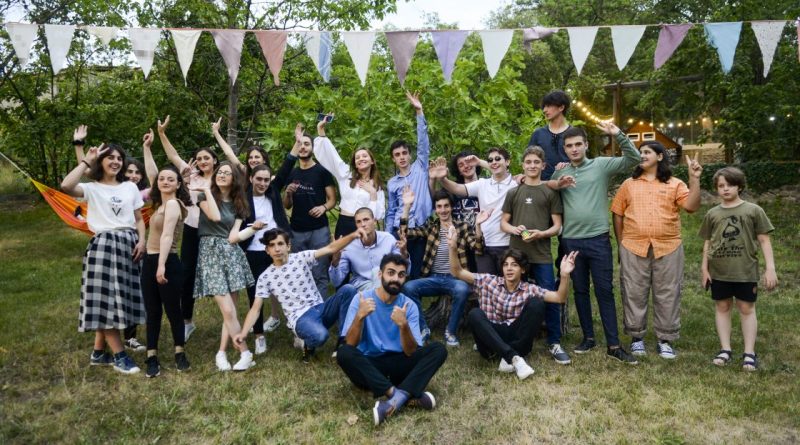Tsalka LAG – Tsalka Local Development Group
Tsalka LAG was formed within the framework of the “This is Tsalka” project, which, in turn, is part of the ENPARD project and was implemented by CENN.
It unites those who aimed to improve Tsalka’s daily life. Today it has more than 200 such members. implementation of the projects started by changing the lives of ordinary people.
Mziuri Markoidze had a sewing shop in the basement and could not serve a large number of clients due to the lack of appropriate technical equipment. It is the merit of LAG that today it can carry out its activities in a well-equipped space and with improved technical resources.
Local family activity continued for Mziana Rezesidze by creating her own catering facility. If years ago she used to take orders for various food products in her family, today she already enjoys the status of an entrepreneur. With Tsalka LAG’s support, the food facility meets all the standards that such an institution should meet.
Melano Tkabladze, the project manager, tells that the majority of the LAG projects were successful. In her opinion, the increased tourism potential of Tsalka and its improved visibility is the result of the work of the local development group. The establishment of 18 tourist accommodation facilities employed more than 200 Tsalka residents, and Tsalka was “branded as a tourist destination”.
– the improvement of service quality at the following facilities: Restaurant “Pontia”, “Ana’s Cafe”, and “And Cherry” is the merit of LAG. The Lag opened an “ice cream shop” as well. Melano Tkabladze tells us that the development of young people, their interactivity, and their involvement in various projects is important for Tsalka local development group. For this purpose, more than 160 young people took advantage of “green camps” and enlarged their knowledge in different areas. One of the priorities for Tsalka LAG members is integration between ethnic groups. “Social evenings” are organized for representatives of different ethnic groups, where they have the opportunity to talk, discuss and express their needs.
Arrangement/equipment of educational spaces in schools with modern equipment and furniture, infrastructural support for kindergartens, increasing access to drinking water in villages, increasing the involvement of students in online learning during the Covid pandemic – these are the projects on which Nino Tsipiani, a member of the executive board of Tsalka LAG, focuses on and as she says, she can hardly single out any of them.
Tsalki LAG is still active in the 6th year of its foundation. At this stage working on the development of climate-adapted agriculture, 4 beneficiaries are selected, and demo plots are arranged and shown to other farmers. LAG also works to raise awareness of water supply and water resource management. Together with the Council of Europe and Mestia LAG, Tsalka Local Development Group is monitoring the project selected by the locals within the framework of the Rural Support Program. Melano Tkabladze calls LAG a mediator between the state and the population.
“ The mission of the LAG is to establish a strong, local action group which will promote the improvement of the economic and social environment in the region by active advocating, implementation of diverse projects tailored to the local needs, an increase of the awareness of the population, grant issuance economy diversification, research-analyses, and effective mediation. The above-mentioned will contribute to forming a strong civil society and developing local democracy” – Melano Tkabladze.
The activities of “Lagi” in Tsalka had tangible results. Nino Tsipiani, Tsalka LAG executive board member says: “LAG in Tsalka supported educational, social, tourism, agricultural and non-agricultural initiatives/projects and changed the socio-economic situation of the population of the municipality.” People who joined LAG have been given the opportunity to develop social skills, help the population, and the municipality, and continue to support initiatives among the population.”
Author: Guranda Phutkaraya
Azerbaijani translation: Chichak Guseynova
English translation: Tamar Cherkezishvili
The article was created with the support of the Civil Society Institute, within the framework of the project “Civil Society Initiative: Sustainable, Open and Accountable Civil Society Organizations for the Development of Georgia” funded by the European Union and the Konrad Adenauer Foundation. Kvemo Kartli Media is fully responsible for its content and it may not reflect the views of the European Union or the Konrad Adenauer Foundation.
The project is implemented by a consortium led by the Konrad Adenauer Foundation (KAS) together with the following non-governmental organizations – Center for Strategic Research and Development of Georgia (CSRDG), Civil Society Institute (CSI), Counseling and Training Center (CTC), Education Development and Employment Center (EDEC) and European Institute of Policy (IEP).
QvemoQartli.ge
You can use the material only by referring to the site.
